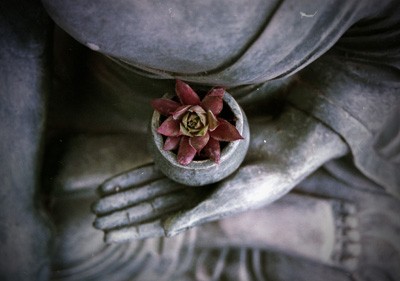Verse 34-7: What the mind is
Part of a series of talks on the 41 Prayers to Cultivate Bodhicitta from the Avatamsaka Sutra (the Flower Ornament Sutra).
- Understanding what the mind is is key in eliminating the wrong views
- Mind is an impermanent phenomenon that has causes and effects
- Continuity of mind and rebirth
- Karma
- The clear and knowing mind
41 Prayers to cultivate bodhicitta: Verse 34-7 (download)
Part 1
Part 2
“May all beings be unkind to wrong views.”
This is the prayer of the bodhisattva when seeing someone not repaying kindness.
Let’s talk a little bit more about wrong views. Yesterday I was saying how they’re all kind of immersed in each other, and how one wrong view often leads to another wrong view. The way I look at it is, I think one of the key things in eliminating the wrong views is actually understanding what the mind is. If you understand that the mind is a phenomenon that is clear and knowing—in other words, it is not made of material things—then we don’t fall into the view of scientific reductionism that everything is just material. If the mind has its own kind of formless nature, then it has its own kind of causes. It has its own way of functioning and being an impermanent phenomenon that has causes and an impermanent phenomenon that has effects.
Then you get into the whole idea of the continuity of mind. That leads you right into understanding rebirth. It can’t be that the mind started at the time of conception and ends at the time of death because it’s a functioning thing. What was the cause of the first moment of mind at the time of the birth and what happens to the mind at the time of death? If you understand something about the nature of impermanent phenomena, and that the mind is a different phenomenon than the body, then that leads you in understanding rebirth.
Once you understand rebirth then you have to ask yourself, “Why do things happen in the way they happen to different people?” When we look only at this life we cannot find reasons that explain why things happen. The only way we can explain—in a sensible manner—why things happen is to look to previous to this life, or to attribute it to an external creator manager.
When we look at the idea of an external creator manager there are many logical faults with that. It’s very very difficult to support if you really use reasoning. Then you’re left with, “Well it must be something from the previous life.” Then that get’s you into the whole understanding of karma and its effects. “Karma and its effects” is another way of understanding causality. It’s one type of causality.
You see the whole idea of causality is actually involved in this whole thing, isn’t it? If you understand causality then you have to look at the mind as a caused, conditioned phenomenon that causes and conditions things in the future. That brings you into rebirth. If you look at why, once we have rebirth, things happen the way they do, then we have to have karma and ethical causality.
Again, if we look at the mind and exactly what the nature of the mind is, we see it’s something that’s clear and knowing and the defilements are not inherent in the mind. In other words, the mind has one nature, the defilements are something added on top of it. Therefore, the defilements can be eliminated. If the defilements can be eliminated then you have true cessation and true path. That’s the Dharma refuge. If you have the Dharma refuge, you have the Buddha who taught it, you have the Sangha who actualizes it. You have the existence in the Three Jewels. You see, all of this somehow ties back into really understanding the nature of the mind and how causality works.
It’s something very important to really think about, this whole idea of causality, conditionality, dependence. How things arise dependent on other factors and are conditioned by other factors and cease when their conditioning causes cease. Very, very important understanding. You can see how it ties into so many different areas. As soon as you talk about some kind of permanence, or as soon as you talk about the mind as the same thing as the body, then you run into all sorts of difficulties.
[In response to audience] The question is how do we begin thinking about rebirth if our memory is only of this life, since we only remember things of this life, then we think that this life is all that exists.
That’s based on an assumption that if we don’t remember it, it doesn’t exist. Is that reasonable? If I don’t remember something, it doesn’t exist? How many times have you not remembered where you put your car keys? Does that mean that your car keys don’t exist, just because you can’t remember where you put them? We have a very poor memory, and it gets worse as we get older. The fact that we don’t remember something doesn’t mean it didn’t happen. It doesn’t mean it didn’t exist. Especially when you consider everything that happens between leaving one life and taking rebirth in another life. There are a lot of things that go on and your mind can be very tumultuous and confused during that time because you don’t know what’s happening to you. You have no conceptual framework with which to understand it. The mind is just being buffeted around by all of this karma that’s ripening.
When you finally land in another body, if you are a human being you are a baby. How much do you understand then? Not very much. We can really see that between one life and the next there’s a lot that goes on. To expect us to have a clear memory of the preceding life is difficult.
They even say that when you’re meditating to develop the divine eye, or to develop recollection previous lives (that’s actually not the divine eye, it’s another one), they say that when you train to do it you start remembering back day by day. When you get to the time of conception (Imagine even being able to remember the time of conception, that’s already pretty big) then it’s really difficult there to make the memory jump into the previous life.
When you want someone to leave you alone you just forget them and they cease to exist? You have bills? Well that’s a good way to cancel them all out, they cease to exist. [laughter]
Venerable Thubten Chodron
Venerable Chodron emphasizes the practical application of Buddha’s teachings in our daily lives and is especially skilled at explaining them in ways easily understood and practiced by Westerners. She is well known for her warm, humorous, and lucid teachings. She was ordained as a Buddhist nun in 1977 by Kyabje Ling Rinpoche in Dharamsala, India, and in 1986 she received bhikshuni (full) ordination in Taiwan. Read her full bio.


